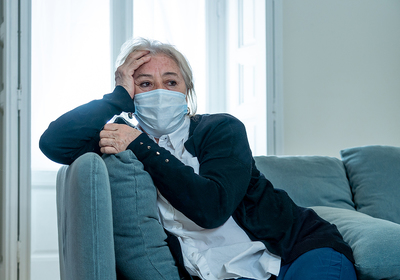
While staying home may protect people living with addiction from exposure to the coronavirus, it may result in other health risks.
Social distancing is considered to be one of the best defenses against the spread of COVID-19. However, the isolation it leads to is not without consequences of its own. While all people are impacted by pandemic-related social distancing requirements, experts say that people with substance use disorders (SUDs) and those who are homeless face unique risks of overdose and HIV infection. Here’s a closer look at the phenomenon, why its occurring, and what can be done to manage it.
Social Distancing and Public Health
Also called “physical distancing,” social distancing involves the reduction of face-to-face contact between people to limit the spread of germs. Unfortunately, social distancing can also lead to increased feelings of loneliness and isolation, which in turn can lead to stress and anxiety.
Healthy coping techniques can help mitigate these effects in order to keep people healthy—both physically and mentally. However, for people in certain at-risk communities, social distancing is accompanied by a different set of risks.
Social Distancing and At-Risk Populations
Social distancing is especially important for people who are at higher risk of complications from COVID-19, according to the Centers for Disease Control and Prevention (CDC). This may include people who are facing homelessness, people with SUDs and people with HIV who aren’t on effective treatment. In fact, the National Institute on Drug Abuse issued a warning last spring advising the research community about an “urgent need” for more information on the risks and outcomes for COVID-19 infection among individuals suffering from SUDs.
But that’s not the extent of the problem. In addition to the fact that the virus spreads more easily among populations where homelessness and addiction are rampant, these same individuals are less likely to have access to critical social support due to social distancing mandates.

Lack of access to critical support networks can lead to relapse for people with SUDs.
“Many recovery support services like behavioral health counseling and peer support groups are upended right now. We are circulating online resources, and luckily a lot of groups are offering virtual support meetings and contact with recovery coaches. But it’s a real change for a lot of our patients, and it’s a sudden loss of concrete support,” Jessica Taylor, MD, told Boston Medical Center’s HealthCity. Dr. Taylor is the medical director of Boston Medical Center’s Faster Paths to Treatment program.
Even more alarming? While the majority of public health efforts remain focused on COVID-19 prevention, another potential peril is rising: as the pandemic comes between injection drug users and the services that provide hygienic syringes and equipment, we may also see a rise in HIV infections.
“One challenge is that the public health messaging to stay socially distanced is really in direct conflict with the overdose prevention messaging that we’ve been giving people for many years—never use alone, use in a group, have someone close to you who can give you Narcan and call 911. We need to be thoughtful about how we apply social distancing messaging to patients who face significant risks from isolation,” Taylor continues.
According to Taylor, education is key. But even the shift toward delivering prevention messages via telemedicine puts high-risk patients at further risk as they’re less likely to have access to phones and/or places to call.
If you or someone you love is struggling with drug misuse and addiction, drug overdose risk is just one of the obstacles you’re facing. Ultimately, substance abuse treatment can mean the difference between your overall health and wellness and being at increased risk for emerging threats like COVID-19. Harris House has been providing individualized rehabilitation programming in the St. Louis area for more than 50 years. Call us to learn about admissions today.







